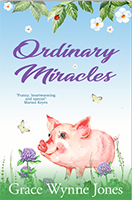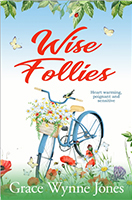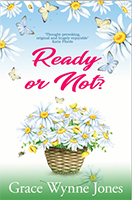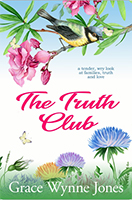The Irish Rectory, The Holiday, and Bath Man
My childhood home was a rambling rectory deep in the Irish countryside. The arrival of the postman was a very significant event, as was the occasional appearance of a bat, but more of that later.
I was living in a rectory because my Dad was a clergyman. Protestants were not plentiful in southern Ireland, but Dad found a way to create a grand ‘choir’ in our sparsely attended church. Passers by were amazed at the choral grandeur, there were usually only a few cars and the odd bicycle outside the church during services. Little did they know that the soaring voices came from the choir of St. Martin-in-the Fields, London. There are times when a vinyl record and a gramophone can come in very handy.
I spent quite a lot of time happily on my own as a child, good training for a writer since it isn’t the most obviously sociable of occupations. I say ‘obviously’ because fictional characters can be great, sometimes elucidating, company. As a child I also learned that nature can be a wonderful companion, a playmate.
One of my playmates was a pony called Merrylegs. He was given to me free gratis because he had a bit of a reputation. He was an absolute darling with me. On one memorable occasion I brought him into the rectory to watch a bit of telly. My parents were off shopping so the coast was clear, or so it seemed. But two local men arrived at the door and, as I spoke to them, I wondered why they were looking quite so flabbergasted. It was because Merrylegs was standing behind me, he had followed me into the hallway.
Most days in the rectory were far from fast-paced, but there were occasional flurries of excitement, such as when a bat flew into my bedroom. My mother was delighted, she was an ardent fan of animals. Our menagerie, at different times, included tree frogs, ground squirrels, a tortoise, a goat, hens, birds, many dogs, a cat, a pony, and a chameleon. (No wonder animals often find their way into my books, for example a key character in ‘Ordinary Miracles’ is Rosie, a wise pet pig, and there’s an opinionated budgie in ‘Wise Follies’.)
But let’s get back to the bat – I implored my mother to keep the thing away from me because I’d heard they could get stuck in your hair (not true, bats have no interest in flying into hair). The bat was liberated, but later got a mention in ‘Ordinary Miracles’ as a reminiscence from Jasmine’s childhood.
One of the eccentricities of the old house was that the bathroom was huge for no apparent reason. It was where I experimented with Badedas. The ad for it said ‘Things Happen After A Badedas Bath’, apparently it had something to do with horse chestnuts.
In one of the Badedas ads a woman, who’d just had a bath, gazed out the window at a handsome man who seemed very keen to meet her. As a teenager I was keen to try this out for myself, but no handsome stranger appeared, out of the blue, on the lawn.
A good way to make up for such early disappointments is to write far more satisfying scenarios in a novel. But early disappointments can also usefully remain without a makeover. When Jasmine has a Badedas bath in ‘Ordinary Miracles’ what happens afterwards is far from satisfactory – a bat flies out of the airing cupboard.
I was keen on writing as a child, in the rectory it was regarded as a routine activity. The tap tap tap of the typewriter was often in the background as my mother, and father, composed heartfelt letters to The Irish Times. My father had written some educational books, and my mother would go on to write a fascinating memoir, In Ruin Reconciled, about life in a Big House in Ireland, and exotic periods abroad.
Born in Eastbourne, as a tiny girl she’d been unofficially adopted by the rather grand de Vere family, who lived in Ireland. She never discovered who her birth parents were, such a sad mystery. Perhaps this secret inspired me to include a mysterious missing relative in ‘The Truth Club’. Families, and their secrets, can be so layered and intriguing, so poignant. It is a theme I have often returned to in my writing.
I was at boarding school when my first short story was published. It was about a girl meeting a handsome, free-spirited young man, at a dance. Delicious though the mutual attraction was, he was a wanderer and so he wandered off shortly afterwards. The romance was spectacularly brief, but found its way into print.
The publication was Jackie: pop stars, romance, crucial tips about blue eyeshadow, a variety of riches! And there, amidst the cornucopia, was my fiction, though now oddly retitled ‘A Reader’s True Experience’.
I have since written many other short stories, some plays, and loads of articles for national newspapers. I also once had a column called ‘Hardware Retailer Of The Month’ in a trade magazine. Turns out there are lots of things you can say about shelving.
But as for writing novels, that came a while later. While working for two London publishers, doing junior editorial jobs, I’d noticed many people wrote books that didn’t get published. (This was long before technology transformed self-publishing.) Anyway, what would I write about? Would anybody want to read what I’d written?
Little did I know a confiding character can come to you, share the details of her life with such urgency, such candor, that you feel impelled to write them down. That’s what happened to me with Jasmine in ‘Ordinary Miracles’. She’s in a dodgy marriage and in quiet desperation. ‘You wouldn’t think to look at me that all this stuff is going on in my head.’ she reveals.’Apparently I appear very settled and cheerful – not at all wistful. The thing is I don’t think I can keep all this to myself much longer. I think it may start leaking out.’
Given her dilemmas, it seemed only fair to send Jasmine off on a nice holiday with a difference. Thankfully I had already unknowingly done the research, having been on one myself.
‘d like to say I scampered off on my ‘holistic’ holiday in Greece with an air of abandon, but I didn’t. I brought a ridiculously large suitcase with me, and The Tibetan Book Of Living And Dying, which remained mostly unread in said suitcase. Writing books was very far from my thoughts and I was prone to occasional bouts of sobbing.
I should explain the sobbing – my beloved and elderly father had died some months before, aged ninety two. We’d been extremely close, despite the larger than usual age gap. He was in his early fifties when I was born. Originally from Wales, he was a man of great zest, many enthusiasms. Very good at thinking outside the box too, though it had been a long while since he’d brought choral grandeur to a country church.
Dad was behind the holistic holiday, how pleased he would have been to know it provided invaluable material for my first two novels! He’d left me some money, he wasn’t rich but it was certainly enough to be very useful, and liberating. It funded the writing of my first book, and my holiday escape.
Yes, a Greek island beckoned, though my arrival there was somewhat arduous. The ridiculously large suitcase had to be lugged uphill to my small, but picturesquely thatched, sleeping quarters.
Sunshine, how glorious it feels on pale, often office-bound, skin! It’s no wonder a friend claims many of us dearly want to spend more time under an olive tree, eating figs while we’re at it. Not only were there olive trees, there was the sparkling azure sea, the cicadas, the wafting scents of thyme and rosemary. If there’d been a friendly horse to explore the beauty with it would have been even more delightful.
Yes, Atsitsa was very nice indeed, and most of my holiday companions had also gone there solo. As the sun rose a cockerel kicked off his exuberant serenading, and it was soon time to get up and head for yoga.
I’d been introduced to yoga while living in California and I had no wish to excel at it. The fact that I was doing the thing at all was enough. Any yoga teachers I’d had were pleasantly unremarkable. Until the yoga teacher on my holistic holiday that is…
Tall, lithe, bronzed, the yoga teacher was American. He wasn’t handsome in a Hollywood way, features not entirely symmetrical and his sandy hair was a bit thin. But what did this matter! He exuded confidence, vigor, had a breezy charm, an adorably playful sense of humor. What’s more he was very good at yoga, could stretch himself into the most amazing contortions. I wasn’t the only one who found him utterly enthralling. I was smitten like the girl in ‘A Reader’s True Experience.’
Developing a crush on a yoga teacher is, I later discovered, not that uncommon. So what if they are simply telling you to extend your legs in the Downward Dog, a brief guiding touch can set you atingle. A friendly smile may seem to contain secret romantic interest. One’s interest in yoga can soar astronomically.
Yes, there was a skip in my step on my holiday, adoration was in the air and I felt like a romantic teenager. Recently bereaved, I also felt the need for an occasional sob, but that was ok, expressing one’s feelings was fine and dandy. Great!
I’m not a fan of the stiff upper lip and many of my characters long for someone they can truly be themselves with. I became surprisingly fond of Ava, a match-making, emotionally guarded Mum in ‘Ready Or Not?’ How anguished she feels when her husband leaves their comfortable home, decamps to the garden shed.
As for things comfortable, on the holiday stepping outside one’s comfort zone was encouraged. I found myself volunteering to organise a Passion Evening. Me, organising and hosting a Passion Evening. As a kid I’d dreaded doing a Bible reading in church, and I still find public speaking pretty frightening. But yes, I’d put up my hand and no, the Evening wasn’t a holistic orgy. People shared their personal passions and I quite enjoyed it. A bit like the bedroom bat, it wasn’t as scary as it first seemed.
Along with enthusiastically attending yoga classes I also, far less passionately, tried a bit of windsurfing. I actually stood upright on the board for a wee while. In ‘Ordinary Miracles’ Jasmine is euphoric when she manages this too.
One evening I, and some others, got a taxi to the town of Skyros. The taxi driver was driving quite fast, playing music very loudly. Annie Lennox singing ‘Why’ suddenly blasted forth. Somehow I’d never heard the song before. Maybe it was the heat, the velocity, the cramped seating, but suddenly the night was suffused with an almost hysterical melancholy.
Grief is like that, can find you suddenly, swell up in music, a memory, a fragrance, sing the hollow song of loss.
Grief often finds its way into my writing, humour too. Who knew that evening pottery classes could get so steamy, but that’s what happens in ‘Wise Follies’ when Alice has a torrid crush on her teacher. A passing interest in hand coiled pots soars astronomically. These things can happen, I know.
Now, years later, I suspect my torrid crush on that yoga teacher was part of an older story, one that began in the rectory. Stricken with grief maybe I turned to a familiar, and unlikely, source of comfort. I projected longings onto an idealised stranger, a newer, bendier, version of the Badedas man. My feelings were unreciprocated, I doubt horse chestnuts would have helped.
Yes, ‘Good anecdote, bad reality’ as Carrie Fisher once remarked.
Somewhat ridiculous too.
Seems we sometimes need to be tender with the ridiculous, in life and in print. Writing fiction allows one to explore life’s soft, sometimes baffling, underbelly. As a reader I love it when a book feels like a friend.
‘We read to know we are not alone,’ commented C.S. Lewis.
As the years pass some childhood memories seem even more precious, want to be explored more in my writing. Not all are playful, joyous, some whisperingly confide longings. They are longings that a child would not know how to name.
‘Keep true to the dreams of your youth’ advised Friedrich Schiller.
And as for getting older, well it’s rather mixed, but here’s an uplifting quote from Picasso which I used in ‘Ordinary Miracles’.. It may appear strange, but if you sit back, soften your gaze, there seems an unlikely truth to it:
‘To be young, really young, takes a very long time.’









